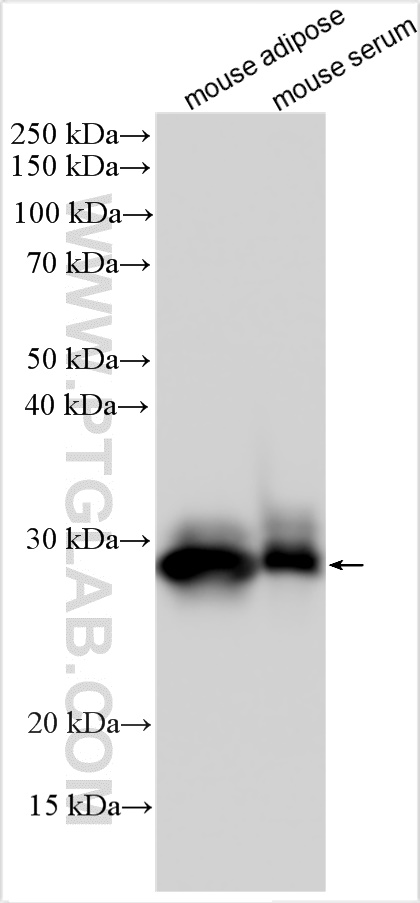Adiponectin Polyclonal antibody
Adiponectin Polyclonal Antibody for WB, ELISA
Host / Isotype
Rabbit / IgG
Reactivity
Human, mouse
Applications
WB, ELISA
Conjugate
Unconjugated
Cat no : 30723-1-AP
Synonyms
Validation Data Gallery
Tested Applications
| Positive WB detected in | mouse adipose tissue, mouse serum |
Recommended dilution
| Application | Dilution |
|---|---|
| Western Blot (WB) | WB : 1:1000-1:6000 |
| It is recommended that this reagent should be titrated in each testing system to obtain optimal results. | |
| Sample-dependent, Check data in validation data gallery. | |
Product Information
30723-1-AP targets Adiponectin in WB, ELISA applications and shows reactivity with Human, mouse samples.
| Tested Reactivity | Human, mouse |
| Host / Isotype | Rabbit / IgG |
| Class | Polyclonal |
| Type | Antibody |
| Immunogen | Recombinant protein |
| Full Name | adiponectin, C1Q and collagen domain containing |
| Calculated Molecular Weight | 27kd |
| Observed Molecular Weight | 28 kDa |
| GenBank Accession Number | NM_009605 |
| Gene Symbol | Adiponectin |
| Gene ID (NCBI) | 11450 |
| Conjugate | Unconjugated |
| Form | Liquid |
| Purification Method | Antigen affinity purification |
| Storage Buffer | PBS with 0.02% sodium azide and 50% glycerol pH 7.3. |
| Storage Conditions | Store at -20°C. Stable for one year after shipment. Aliquoting is unnecessary for -20oC storage. 20ul sizes contain 0.1% BSA. |
Background Information
Adiponectin (AdipoQ), an adipocyte-derived hormone, is one of the most abundant adipokines in the blood circulation. Adiponectin modulates a number of metabolic processes, including improving INS sensitivity and anti-inflammatory activity. The role of AdipoQ in reproduction is not yet fully understood, but the expression of AdipoQ in reproductive tissues has been observed in various animals and humans, including chicken testis, bovine ovary, and human placenta. AdipoQ May play a role in cell growth, angiogenesis and tissue remodeling by binding and sequestering various growth factors.
Protocols
| Product Specific Protocols | |
|---|---|
| WB protocol for Adiponectin antibody 30723-1-AP | Download protocol |
| Standard Protocols | |
|---|---|
| Click here to view our Standard Protocols |


